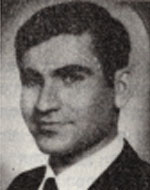Shiri, Benyamin
Benyamin, son of Simcha and Akram, was born on 15.11.1941 in Baghdad, Iraq. In 1951, when he was ten years old, his family immigrated to Israel and settled in Moshav Kadima. He first studied at the elementary school in the moshav and later continued his studies at the ORT vocational high school in Netanya. He was a diligent and sharp-minded boy, and although he had to help his parents in farming their farm, he was an outstanding student. From his youth he was active in the “Hanoar Haoved Vehalomed” movement in Kadima, especially in the camps and sports sectors. He completed his studies at the Air Force’s pre-military technical school. Benjamin was drafted into the Israel Defense Forces in early February 1960 and was assigned to the Ordnance Corps as an electrician, and after completing his regular army service he worked in the security service and during the Six Day War he fought in Sinai. He was an exceptionally entrepreneurial man who was exceptionally well-mannered and had the ability to solve almost any technical problem that was posed to him, and as a hobby he loved swimming and fishing and when he managed to get out of his studies and in his work, he spent his time at sea. In 1972 he was awarded the rank of master sergeant. During this period he served as a senior electrician in his department and in all the opinions of his commanders he was noted as an excellent professional, entrepreneurial, disciplined, accepted and very much loved by his commanders and subordinates, efficient and dedicated to his job. In his memoirs, his friend described him as a commander who did not like to give orders. He was like a good father to all his soldiers, taking care of their comfort and well-being always and everywhere. In days of pressure and shelling he would come and check himself if all his men were safe. He could restrain himself even from things he had been free of and had not complained to anyone. Above all, he had an exemplary family, proud of his wife and children. All his life he excelled in his devotion to tradition and loyalty to the values of the people. When he stayed on the Sabbath in the camp with his soldiers, he always used to sanctify the Sabbath, was a kiddush editor and always kept a bottle of wine for Kiddush. On the eve of the war, when he was on alert, he was given permission to visit his wife, who was pregnant. In order not to desecrate the sanctity of the holiday, he walked a long distance to the place where he met his wife. When the Yom Kippur War broke out he was sent among the first to the battlefield in Sinai, and left the war peacefully. On the 28th of Kislev 5734 (23.12.1973) he fell while fulfilling his duties and was brought to eternal rest in the cemetery in Ra’anana, leaving behind a wife and three children, parents and three sisters. To commemorate his name, his family donated chandeliers to synagogues in Ra’anana and Kadima. They also donated a Torah scroll and Hanukkiyah, which was placed on the roof of the synagogue in Kadima.
